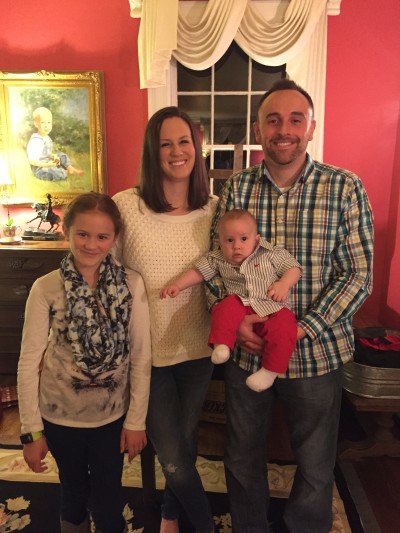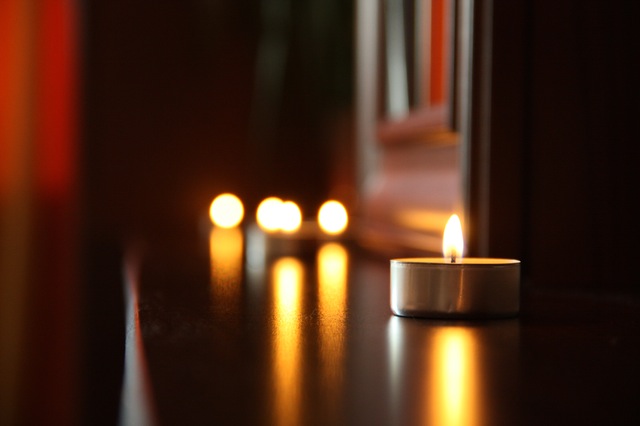Anna King is a PhD student at Georgia State University,  a mother of two, and a small-business owner (she runs a soy candle business with her husband Chad). Her other passions include fitness, preferably Cross-fit at her local gym in McDonough, Georgia. King’s works have been published in literary magazines as well as academically in the “Ellen Glasgow Journal of Southern Women Writers.” King was offered a fellowship by the Summer Literary Seminars and she has been nominated for a Pushcart. King’s chapbook “Simbelmynë” is a finalist for the 2015 Anzaldúa Poetry Prize.
a mother of two, and a small-business owner (she runs a soy candle business with her husband Chad). Her other passions include fitness, preferably Cross-fit at her local gym in McDonough, Georgia. King’s works have been published in literary magazines as well as academically in the “Ellen Glasgow Journal of Southern Women Writers.” King was offered a fellowship by the Summer Literary Seminars and she has been nominated for a Pushcart. King’s chapbook “Simbelmynë” is a finalist for the 2015 Anzaldúa Poetry Prize.
Taeler Kallmerten: What thing did you see today that most stayed with you?
Anna King: I work as a teacher with struggling students, many of whom have learning differences, many of whom do not fit in socially. Today is the ribbon cutting ceremony of our newly renovated Estes Learning Lab—a badly needed update to a program that has been underfunded for years. Seeing my community rally together to set up an environment to help non-traditional learners has been both humbling and inspiring.
Kallmerten: When did you realize your passion for poetry?
King: Like many writers, I was a young child when I realized how much I loved to write about things I saw that moved me. Someone once said that only two things pierce the human heart: beauty and affliction. My clearest early memories about writing are of admiring natural scenery and feeling a near obsessive burning to communicate on paper what I experienced.
Kallmerten: Can you describe your writing process and any advice you have been given?
King: Writing has become increasingly challenging since I had my second child, and I already work a full time job as a teacher and attend graduate school. I often don’t get much writing done until I am on significant breaks like summer vacation or spring break. When I do, I put on music—Third Eye Blind is my favorite—and often start with an image or a combination of words. From there, I weave that concept into a poem. I often can write a poem fairly quickly, but then I may continue to revise for even years afterwards. The best advice I received was to write first and then worry about where to put the poem in your manuscript later!
Kallmerten: What are you trying to communicate throughout your chapbook?
King: I started the chapbook a couple of years ago believing that I was going to tell the stories of people around me who had experienced pain. Some of my family members and friends had seen personal tragedy such as the death of children and the brutal shooting of a family pet by a police officer.
But then the chapbook became a chronicle of my own growth when I met the man who is now my husband and fell in love with him. Later on, a friend of mine was horrifically murdered in a hit and run—and her fiancé was driving. She was five months pregnant. The chapbook evolved again as an outlet for dealing with that grief. I worked through that grief and eventually was able to find peace. The work concludes that I finally understand how to be willing and able to love the people who already love me, regardless of how terrifying it is to be that open again.
What we do with pain becomes a second skin. I make tourniquets and remedies for an emptiness that runs universe deep. My ten years of my dishonesty is Meghann–who used nakedness to answer all of us. And all of this we never wanted. Last week I filled the car with shrieking–thick and succulent–while I was on the interstate. Her birthday is on a Wednesday and I am undone.
– Anna King
Kallmerten: In Part IV you mention something called a “second skin.” Can you explain what a second skin is and why you believe it coincides with pain?
King: I believe the “second skin” is a mask we wear to cope with pain, any pain. No one gets an instruction manual to deal with grief until after they realize they’ve done it all wrong and they attend counseling or read self-help books. So many of us wear a variety of these “second skins”– drug addiction, infidelity, abuse, anxiety, depression, or obsession with achievement. Unfortunately, the mechanisms we use to try to deal with our pain often result in destruction. I saw that about myself as I wrote the chapbook.
Kallmerten: In the second to last poem of Part III you write “The heresy of silence fills me again when Chad begs say what you feel.” Can you explain this line, specifically the “heresy of silence”?
King: My husband, Chad, and I are very different, and during my grieving process for my friend Meghann I would often shut him out and would not say how I was feeling. Sometimes that was because I felt so many conflicted things I had no idea how to name what I was feeling exactly. Sometimes I just didn’t realize how long I had been bottling it up. I started to see that when I stopped talking that I was reverting back to bad habits. It became increasingly important in that grieving process to voice to him things like, “Today in the car I thought I saw her,” or “I had a dream about her,” or “I came across an old picture and I felt so angry.”
Deconstructing water is for the birds. The heresy of silence fills me again when Chad begs say what you feel. Soundlessness thickens my gums as I think of what is next–creating friezes monuments obelisks with gerunds and such. But I see the ocean as a gazillion salt shakers instead of the largest cemetery. The days balloon. The nights breathe. I have become a project of cartographers.
– Anna King
Kallmerten: Have Old English elegies had any influence on the style of your Chapbook?
King: I do love elegies, and I have studied them considerably over the years. Some of the most beautiful poetry is written in elegiac form. I feel like my work is an elegy for more than one person, but that the losses happen at different times. Some of the “loss” in my writing is about death, other times it is about something else. Since experiencing several losses was an ongoing grieving process interspersed with happiness like finding love, it doesn’t quite fit the traditional model. Life felt too big to make it all about what I did not have. However, it was important to me end it on what I do have, which is the consolation.
Kallmerten: Lastly, is there a question you would like to be asked or if given the opportunity would ask another poet?
King: I would love to know how other poets genuinely make the time to write. I often need days to relax before I can decompress enough to write. With the demands of a family and home, what is a woman to do when she needs to write but also has to eat, sleep, and work?

Taeler Kallmerten, Staff Writer


0 comments on “‘Simbelmynë’ – An Interview with Anna King”